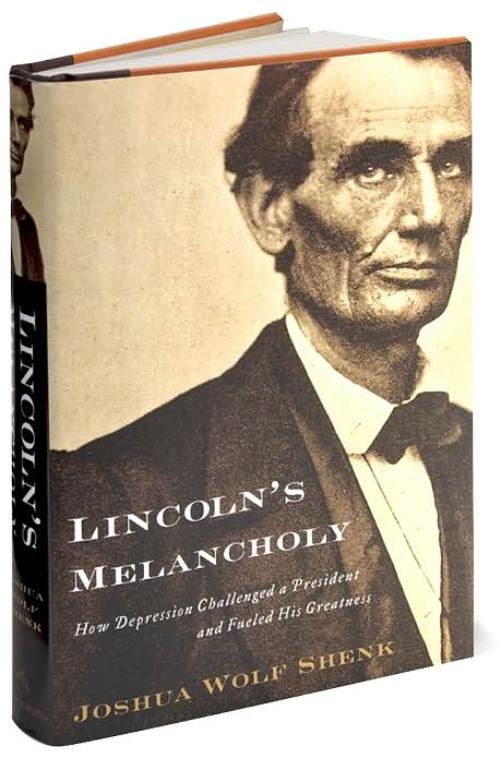
News
HMS Is Facing a Deficit. Under Trump, Some Fear It May Get Worse.

News
Cambridge Police Respond to Three Armed Robberies Over Holiday Weekend

News
What’s Next for Harvard’s Legacy of Slavery Initiative?

News
MassDOT Adds Unpopular Train Layover to Allston I-90 Project in Sudden Reversal

News
Denied Winter Campus Housing, International Students Scramble to Find Alternative Options
Was Abe’s Depression a Boon?
"Lincoln's Melancholy" by Joshua Wolf Shenk '93

The next time you handle a $5 bill, take a look at Abraham Lincoln’s
face. His expression suggests a gloomy disposition, even depression—an
illness that today might be a political liability.
That image of Lincoln is historically accurate, according to
Joshua Wolf Shenk ’93, author of the new book “Lincoln’s Melancholy.”
But Shenk argues that, instead of being a tragic flaw, the Great
Emancipator’s depression was a key source of his success.
Shenk, also a Crimson editor, got this idea seven years ago
when he saw a reference to Lincoln’s melancholy in a sociologist’s
essay about suicide.
Although Lincoln’s “melancholy” was well known among his contemporaries, it has been largely ignored by historians.
“There’s never been a book to focus on Lincoln’s melancholy and
to gather together all of the material related to the melancholy and
make sense of it,” Shenk says in a phone interview.
Shenk took both a professional and personal interest in the
topic of mental illness. “I was used to studying politics and culture
and history and was also really depressed myself,” he says, adding that
since his late teens he has struggled to manage depression. “I thought
that I could chart a course for my own self by studying the subject in
my professional work.”
Shenk’s personal experience with depression gives his version
of Lincoln an underlying sympathy and sensitivity toward Lincoln’s
forlorn thinking. But Shenk says that he has no personal agenda with
this book other than to present a new view of Lincoln.
“I haven’t been using Lincoln to understand myself,” he says.
“I’ve learned many things that are helpful to me, but they’ve all come
from setting myself aside and looking at Lincoln on his own terms.”
Shenk’s ability to weave a compelling narrative is indeed the
book’s greatest strength. He offers a sort of “E! True Hollywood Story”
behind nearly every major event so famously associated with Lincoln.
The character of Lincoln in Shenk’s book is one who deprecated
himself after his hugely successful speech to financial leaders at
Cooper Union’s Great Hall in New York in 1860, who wrote dismal verses
about death and suicide, who emanated sorrow that at once frightened
and attracted people near him.
However, this is also a man who translated his “depressive
realism,” a term Shenk quotes from psychological literature, into a
passion for finding and accomplishing a greater purpose while
weathering life’s tribulations.
Like this version of the book’s hero, Shenk is humble,
recognizing his own limits as a historian. Referring to some
historians’ claims that Lincoln was homosexual, Shenk doesn’t rule out
such a possibility, but writes that “with people in history, our
understanding is limited by available texts. Intuition and common sense
can help, but only if they’re leavened by an awareness that the world
we see ‘onstage’ is different from the world we live in.” The fact that
Lincoln and companion Joshua Speed were bedmates was not unusual in the
nineteenth century, and “a frank avowal of our ignorance is the first
step in honestly dealing with Lincoln’s sexuality,” Shenk writes.
When he writes of Lincoln’s views on slavery, Shenk is just
as sensitive to Lincoln’s cultural environment. Shenk acknowledges that
Lincoln was in no way fighting in favor of equal rights for
African-Americans—only for the abolition of slavery as an institution.
But despite the focus on Lincoln’s depression, particularly
in the discussion of his life before the presidency, Shenk’s book
becomes more about Lincoln’s admirable character traits than his mental
illness. Shenk’s eloquent explications of Lincoln’s speeches—as well as
anecdotes of Lincoln’s kindness and good sense of humor—become more
intriguing than the book’s argument that his great asset was his
melancholy.
Perhaps this is because Lincoln tempered his depressive
episodes as a public figure and older man. But the reader is left with
the impression that many qualities separate from Lincoln’s
depression—including his persistence and his famous lack of malice
toward the South—contributed more to his greatness.
Ultimately, Shenk just wrote another book about the Lincoln
legend. To his credit, Shenk does bring modern psychological knowledge
to bear on our understanding of the sixteenth president.
And his book adds another nuance to our romanticized portrait
of the Illinois Rail-Splitter. But the argument that Lincoln’s mental
condition was central to his greatness loses steam.
That said, Shenk believes that Lincoln’s depression cannot be
separated from his personality, and that the modern tendency to see
depression as distinctly separate from ordinary mental states isn’t
accurate.
“My sense is that Lincoln came to understand that he had a
condition that was somehow organically connected to his
constitution—something he was born with that was not going away,” says
Shenk.
Lincoln’s contemporaries, Shenk says, saw melancholy as a
temperamental style, as part of someone’s character. Those afflicted by
melancholy might have been more prone to nervous states or debilitating
disease. But melancholy was part of a spectrum.
Shenk says that even if readers see Lincoln’s contemporaries’
views on mental illness as inferior to modern psychology, “it makes you
think that these things are in flux, that our relationship to
depression is a relationship of ideas. We’re developing and thinking
about these things, and they can shift over time.”
And so, too, is our view of Lincoln ever-evolving.
—Staff writer Katherine M. Gray can be reached at kmgray@fas.harvard.edu.
Want to keep up with breaking news? Subscribe to our email newsletter.
